Introduction
According to Forbes article, The U.s Spirits Industry Reports A Record 2019, the Distilled Spirits Council of the U.S. (DISCUS) reported that supplier sales were up 5.3% in 2019, increasing by $1.5 billion, to a new record of $29 billion. Volumes rose by 3.3% to a record 239 million cases, an increase of 7.6 million cases from 2018.
.webp?width=600&height=201&name=Content_SpiritsIndustryUp1.5BillionDollars%20(1).webp)
Some growth percentages to note for alcoholic spirits in 2019 include:
- American whiskey up 10.8% overall
- Rye, a critical component of the American whiskey growth, up 14.7%
- Tequila/mezcal, up 12.4%
- Pre-mixed cocktails up 7.5%
DISCUS also highlighted the decades-long trend in market premiumization as consumers shift their purchases toward more expensive spirits.
All of this is great news, right? Sure it! But it means that competition is fiercer than ever. How does your product stand out from the rest?
Distillers need innovative ways to make their brands stand out as competition continues on an upward trajectory. Creative and unique labels are just one way to gain attention and create distinction. Fortunately, there are a variety of labeling technologies that can help make a visual impact on hard liquor enthusiasts everywhere.
Label Design Trends
Your label is a consumer’s first glimpse into what your product is all about. And while its design is what attracts buyers, the information it provides is what ultimately seals the deal. Some pieces of information are mandatory like ABV, and some are optional, but all are important.
There are many labeling requirements, but for quick reference, here are the federal regulations for alcoholic beverages that are distributed to retail stores and restaurants within the United States.
For the more creative element — the label design — here are few trends that are hot in the world of craft spirits packaging right now. Expressing a brand's unique story and product through evocative packaging goes a long way toward any distillery's success.
.webp?width=600&height=300&name=Dieline_FoxlineGin_DesignedByThinkBoldStudio%20(1).webp)
Photo Credit: Dieline, Designed By: Think Bold Studio
- Nostalgic Sensibility - One of the most popular trends is a vintage look that leverages the rich history of the region or brand. Often the packaging uses a contemporary twist on a nostalgic, turn-of-the-century design from either the U.S. or Europe.
.webp?width=600&height=300&name=Dillions_RyeWhiskey%20(1).webp)
Photo Credit: Dillon's Distillers
- Bootlegger & Prohibition - This trend is inspired by the prohibition era bootleggers and speakeasies. This is popular among craft distilleries who feel an affinity with the bootleggers who bucked the status quo. This trend spans the range from home-spun designs with hand-drawn type to more raw, almost un-designed packaging.

Photo Credit: Vinolok
- Copper Admiration - Many craft distiller's honor the tradition of distilling using copper stills — the preferred material for imparting flavor into the distilled spirits. It is not surprising that many have taken this as their inspiration for their packaging. This trend is driven by copper-toned colors and copper-inspired wordplay.
.webp?width=600&height=300&name=Vinolok_PoolVodka-ConceptPackaging_WhatIf%20(1).webp)
Photo Credit: Vinolok
- Modern & Clean - This trend is driven by the market saturation of brands leveraging traditional vibes. A new frontier is striving to define what craft spirits can represent: contemporary and progressive. Many craft distilleries are on the cutting edge of technology and innovation. Meaning, craft distilling doesn't have to be tied to the past to be relevant.
For more information on each of these trends and more, read 5 Trends in Craft Spirits Packaging. Another helpful resource is Market Trends for Distilled Spirits in the United States.
After evaluating your competition and your current label design, take a look at your label application process to be sure it's optimized. No matter how quickly your distilled spirits are bottled, and no matter how awesome your label looks, if your packaging line is slow or inefficient, it can be a significant limiting factor. Consider upgrading or updating your bottle labeling machine — a key component in any packaging line. A labeling equipment investment can pay for itself quickly by increasing efficiency and productivity immediately.
Labeling Equipment Types
Ready to “up” your labeling game? The key is to determine which labeling machine can push the most bottles through the packaging line in less time. Investing in a labeling machine for your whiskey (bourbon or scotch), vodka, gin, or rum will help you ramp up production while maintaining packaging quality — and that may be just what you need to boost sales and beat the competition.
As for labeling application options, applicator machines come in manual, semi-automatic, and automatic models. Knowing label application needs and goal production speed will help narrow down the choices.
Manual labeling machines require workers to load and apply each label individually.
Semi-automatic labeling machines are operated by a hand or footswitch. An employee loads the bottles onto the conveyor then presses a button to apply the labels. This method is faster and more consistent than manual hand labeling. In many cases, a semi-automatic, wrap-around labeling machine is the best option for labeling bottles because it allows you to seamlessly transition to a fully-automatic bottle labelers without having to overhaul your equipment or packaging line.
Automatic labeling machines have rotary and in-line options. Both are quicker and more accurate than manual and semi-automatic labelers. Automatic inline bottle labeler machines provide a massive leap in productivity and efficiency. Once liquor bottles are filled, they can be continuously fed to the labeling machine, resulting in roughly 150 labeled products per hour. Rotary label machines are at the high end of the spectrum, running up to 500 labels per hour and providing ultimate label placement control and consistency. Automatic labeling equipment ranges in capability and price. Choose one that not only fits your current operational needs but can scale with your needs as you grow.
The Importance of Labeling Equipment
No matter how fast you’re able to bottle your liquor, the overall output can be limited by the speed at which you can label bottles and push them to market. One major challenge experienced by many distilleries is the printing and application of labels.
Bottle labeling machines come in a range of prices, which often seems overwhelming to craft distillery owners who are operating on a limited budget. However, the addition of efficient labeling equipment can increase productivity dramatically and pay for itself quickly by ramping up fulfillment immediately.
Efficiency
Typically most distilleries start without a huge upfront capital investment, so to begin production, they have to hand label their alcoholic spirits. However, the addition of one semi-automatic labeling machine, tabletop or modular, can increase productivity by almost 500%, allowing up to 150 bottles per hour to be labeled. These smaller labelers are more affordable for new or small distilleries.

Fully-automatic inline labeling machines are physically larger and a little more expensive, but they can label up to 500 bottles per hour. This efficiency increase allows distilleries to fill more bottles without getting backed logged at the labeling stage.
As more bourbon, scotch, vodka, gin, rum, brandy — or whatever your specialty — leaves the bottling line and hits the market, the right bottle labeling equipment will quickly justify its cost.
Quality
The use of a semi-automatic or fully-automatic bottle label machine gives a distillery the ability to place a well-designed label accurately every time — and we all know that a label with a great design and precise application is a crucial marketing tool.
Label machines are faster, more consistent, and consistently accurate compared to manual hand labeling. The best labeling equipment includes stabilizers that ensure the label is placed evenly and in the same location over and over without movement vertically or horizontally.
Cost vs. Value
While the upfront cost of purchasing or leasing new labeling equipment may seem daunting, it’s essential to evaluate all of the production costs that impact your distillery.
For instance, the one-time purchase of labeling equipment will be significantly less than the cost of hiring a full-time employee to apply labels to bottles or cans. If you already have workers attaching labels, automating your labeling process will free them up to do more pressing and profitable tasks.
Another important part of the cost equation is the reduction of wasted and defective products coming off the line. Labeling equipment is consistent and reliable, so human error is eliminated and fewer labels are misplaced, which saves money. There is something to understanding efficiency and cost savings versus the actual cash price of the equipment. Ultimately, the value of the equipment is greater than the cost in many significant ways.
Evaluating Your Setup
Before making any decisions about the type of label applicator machine you want to purchase, evaluate your current setup, and determine what role the labeler machine will play in your bottling line. It's also critical to establish parameters that will determine the size and type of labeling machine you need. This will help you choose a labeler that meets your needs, fits seamlessly into your current operation, and makes your process more efficient.
Production Run
To properly evaluate your needs, clearly identify your labeling and production goals. Start by deciding the quantity and speed that you want your product to move through the line. Label application equipment comes in different speed ranges, so choose one that fits the speed that your line can maintain.
You'll also need to consider the potential downtime that could occur as you change labeling applications (e.g., moving from hand labeling to a semi-automatic machine).
Any labeling machine you choose for your spirits will come with pros and cons, so look for a labeler that will be simple for you to set up, use, and maintain.
Space and Equipment
Once you have clear goals in mind for the amount of liquor you'll be pushing through your line and at what speed, look for equipment that will fit into the space you have and be easily accessible by workers. Other considerations include existing equipment compatibility and overall packaging line design.

Your production line includes a variety of machines, such as fillers, cappers or corkers, and labelers. For the sake of efficiency, it is best to purchase a labeling machine that is compatible with the equipment that you already have in your line to prevent problems. This is also an opportunity for you to decide whether you want your labeling machine to fit in line with your current machinery, or if you would prefer a freestanding labeler.
You should choose a labeler that can keep up with your filling and sealing machines as well as scale with your company as it grows.
Container and Label Considerations
In addition to recipes, one of the most interesting changes in the world of liquor and spirits is bottle shape. There have been dozens of differently-shaped bottles produced over the years and in many sizes. More rounded shapes are commonplace in the categories of rum, whiskey, and cognac, where showmanship is a hallmark. They’re almost always made of glass, and some are intricately engraved.
Just like spirit labels have trends, so do bottle types. Currently, there’s a trend that favors user-friendly bottles where the shape, size, and weight are all reasonable, and the height of the neck makes it quite comfortable to hold, making it ideal for bartenders and aesthetically pleasing to consumers.
.webp?width=600&height=300&name=Content_WhiskeyBottleTypes%20(1).webp)
Regardless of your brand’s bottle preference, once you determine your container dimensions, it’s time to decide on label size, style, and placement. You can choose from front and back labels and wrap-around labels.
If you know that your bottle will have an unusual shape or a distinctive taper, you will need to find a labeling machine that can properly affix labels to those unique dimensions. Labeling machines come in a variety of sizes and types but are not necessarily universal to all label applications.
Quality Containers and Labels
For a sharp, professional appearance, choosing high-quality materials is essential. While the right labeler can do a great job labeling your bottles, if the containers being used aren't premium, they can cause issues that make your product look bad.
No matter what you choose, be sure the containers are consistent. Imperfections and inconsistencies in the size and shape can cause your label machine to misread where the labels need to be placed. Inspect your containers regularly for any signs of poor quality so that you can address them before they are filled and improperly labeled.
Label quality is another factor that will determine your overall results. Labels come in many different materials and can use a variety of glues or adhesives when applied to your containers. Poor quality labels are susceptible to tearing, bubbling, smearing, and other label performance malfunctions. Choose a well-known and trusted label brand, and give some thought to whether you prefer a paper or synthetic product.
Remember, poorly designed and applied labels will be easily spotted by liquor enthusiasts who appreciate all aspects of the high-end craft spirits culture, including the detailed bottle design and packaging.
Choosing a Labeling Partner
Choosing the right bottle labeler machine for your liquor will depend on more than just the machine's functionality. When you purchase from a labeling equipment manufacturer or distributor, you also begin an ongoing partnership with them. Here are a few things to consider as you choose a labeling partner.
Parts
Naturally, all equipment is subject to some rate of failure when it's used hard. It's imperative that your labeling machine manufacturer has spare parts on hand and that they're readily available. The longer your machine is down, the less product you can get out of the door — and time is money.
Be sure to ask your labeling equipment provider if any parts are known to wear out and what the wait time is for replacements. This will allow you to plan for any maintenance or repairs that will need to be done without impacting your regular production time.
Service
The key to keeping your packaging line running smoothly is to ensure that your labeling equipment is being maintained and serviced throughout its life. The manufacturer of your labeling machine should be available to answer any of your questions or concerns and assist you in solving minor problems.
The best way to find a reputable dealer is to ask for recommendations within the spirits community. As you look into labeling equipment dealers, consider the timeliness of their responses, whether their solutions are trustworthy, and if they're able to provide ongoing upgrades and continuous support. All of these will be important as your operation begins to grow.
Quality
High-quality products should be the goal of every manufacturer. However, not all companies follow the same set of standards.
To ensure that you are getting the best value for your money, ask your equipment dealer a few questions about their quality control procedures for parts, repairs, and new machines. For instance, find out how they test machines before pre-sale and ask what type of inspections are done on used and refurbished machinery before they resell them.
The investment you make today into labeling equipment for your distillery is going to depend on the support and customer care of the equipment manufacturer long term. As their customer, you want to know that they stand behind their products by providing thorough and helpful answers to your questions, make parts easy to get, and adhere to high-quality standards for all of their equipment, new or used. All of these factors will have an impact on how well your labeling machine performs beyond those first few thousand bottles, and as your operation expands.
Conclusion
As you move toward increasing your hard liquor production with professional labeling equipment, keep in mind all of the decisions you will need to make.
- Evaluate your current packaging line. Determine the number of bottles that need labeling as well as any space and design limitations.
- Once you've set some production goals and have an idea of how you are going to integrate a new piece of labeling equipment, it is time to go shopping. Purchasing a labeling machine will require you to compare the different options, including semi-automatic, fully-automatic, tabletop, inline, or rotary. You'll also need to consider your materials (glass bottle, vinyl labels, gloss paper labels, etc.) to ensure that the labeling machine you choose will perform well.
- Remember that the labeling equipment you choose will also require ongoing maintenance and care to stay operational. You should contact a reputable dealer and get information about their service contracts and the availability of parts so that you will have the resources needed to keep your new machine in working order.
The effective use of automated labeling technology offers significant improvements in productivity and output for distilleries as a whole. However, finding the right labeling machine is the key. Make sure to evaluate all potential labeling machines for quality, speed, and reliability before you make a purchase.
About Pack Leader USA
Who We Are
As our name suggests, Pack Leader USA is a leader in the labeling industry. Built on the research and development of Pack Leader Machinery, Inc., we entered the North American market with high-quality products, modernized labeling technologies, and an excellent customer service reputation. We have taken the labeling industry to the next level by designing easy-to-use and cost-effective labeling machines that serve the growing spirits industry.
Our Commitment
We are committed to providing our customers with reliable machinery, quick service, and readily available parts to ensure uptime and eliminate costly downtime. Before you purchase, we are happy to offer free consultation and, if you’re ready to buy, we’ll walk you through the purchasing process step by step from price quote and delivery to set up and ongoing customer support and training.
We promise to provide more than just a piece of equipment for your packaging line — we’ll come alongside you as your partner.
Set up a free labeling equipment consultation with our team today to learn which of our labelers can help your distillery improve productivity and efficiency and fit your budget.
.webp?width=200&height=114&name=2x-Packleader-logo-large%20(1).webp)

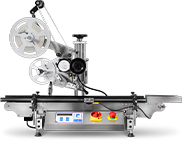
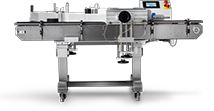
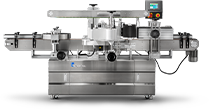
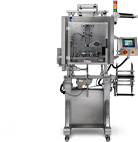
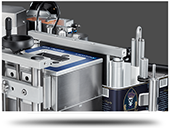
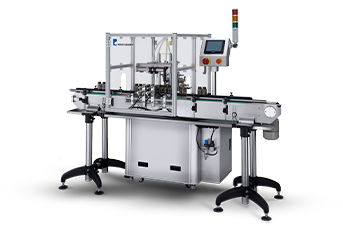
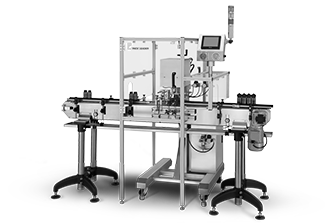
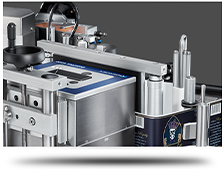





.webp?width=360&name=2x-color-logo%20(1).webp)